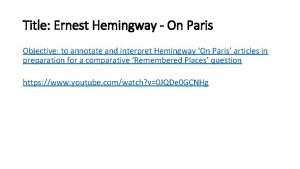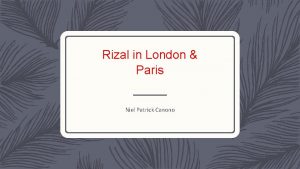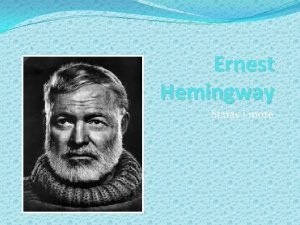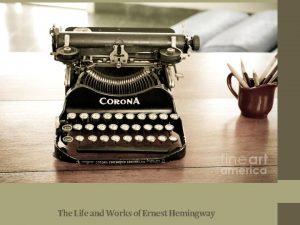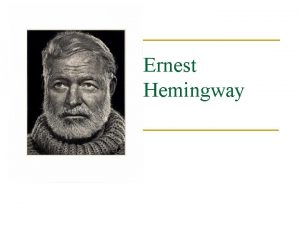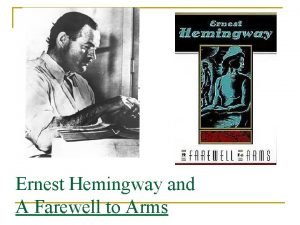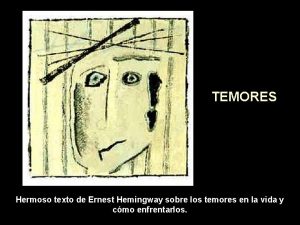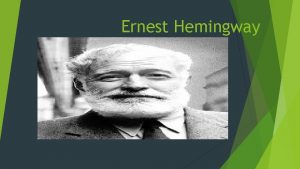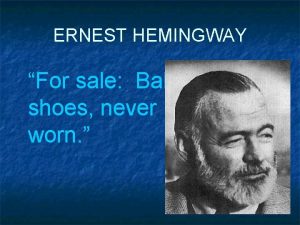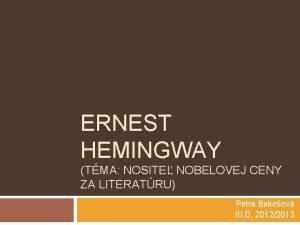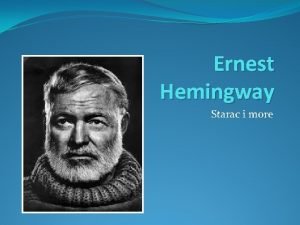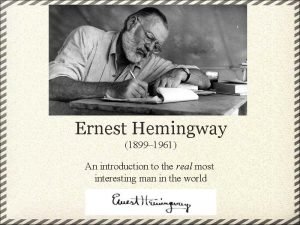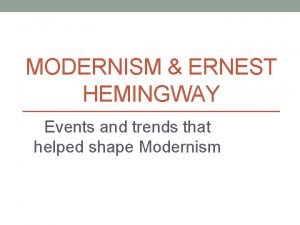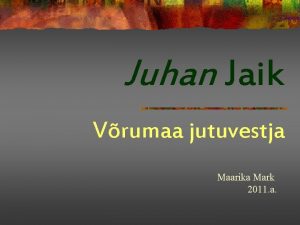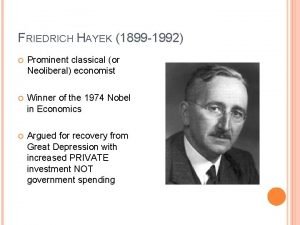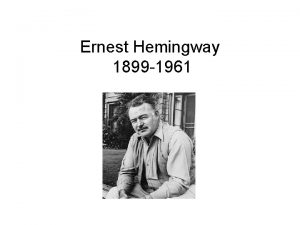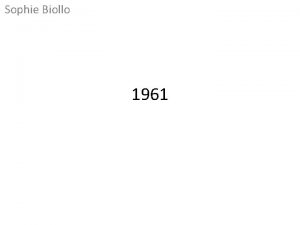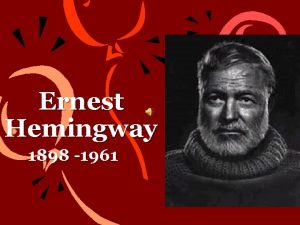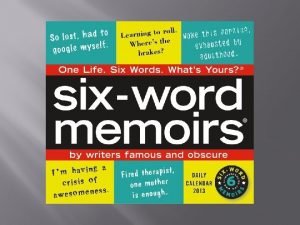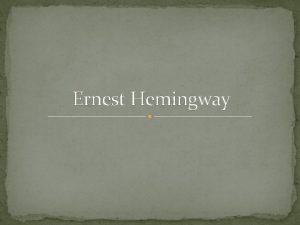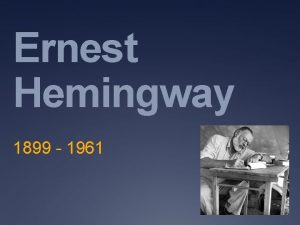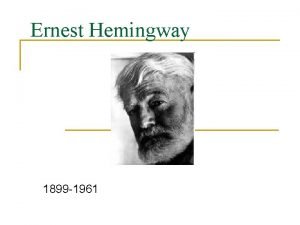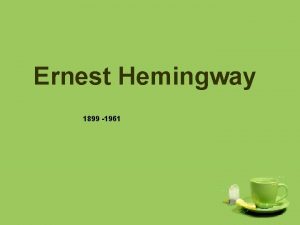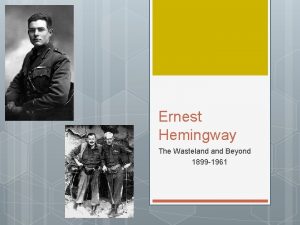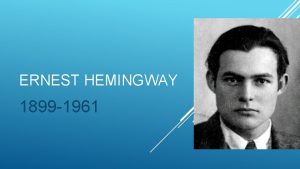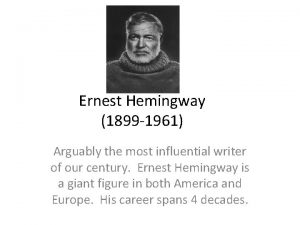ERNEST HEMINGWAY 1899 1961 Another expatriate in Paris





















- Slides: 21

ERNEST HEMINGWAY (1899 -1961)

Another expatriate in Paris � Another writer committed to his times and bonded to his generation, stricken by the 'unreasonable wound' of war � ‘LOST GENERATION’ – term by Gertrude Stein �

� � Comparison with Fitzgerald – writer as performing self Hemingway tested himself on society’s fringes: wrote of bullfighting in Spain, war on the Italian front, the Spanish Civil War, game hunting in Africa – common settings in his novels (vs his stories. Michigan woods)

� � � ‘The art of omission’- journalistic style: concrete, economical, tough, a controlled use of words, precision: ‘All you have to do is write one true sentence, write the truest sentence you know’ cleaving to the hard facts of life, pursuit of concrete fact, describing things for oneself, things as they are, not mediated by convention or abstraction. journalistic training and Gertrude Stein

� � � Tight linguistic economy in his first book of short stories - THREE STORIES AND TEN POEMS, IN OUR TIME (1925) introduced Nick Adams good times of boyhood: not mother and home, but out in the open with father, recreating a frontier idyll. his second collection of stories, Men without women (1927), the best times for Hemingway - had by boys or men together, preferably in some wide space of land or sea: “Once a man’s married, he’s absolutely bitched. ”

� � Tight style complements a tragic stoicism serving on the Italian front in the WW 1 as an ambulance driver sustained serious wounds life was war, nasty, brutal, arbitrary:


WORLD WAR 1

� � fundamental loss and his conviction that modern war and violence emptied the great heroic abstractions: “I was always embarrassed by the words sacred, glorious, and sacrifice and the expression in vain. We had heard them, on proclamations that were slapped up by billposters over other proclamations, now for a long time, and I had seen nothing sacred, and the things that were glorious had no glory and the sacrifices were like the stockyards at Chicago if nothing was done with the meat except to bury it. … Abstract words such as glory, honor, courage, or allow were obscene beside the concrete names of villages, the numbers of roads, the names of rivers, the numbers of regiments and the dates. ” (A Farewell to Arms)

� � ' I did not care what it was all about. All I wanted to know was how to live in it. Maybe if you found out how to live in it you learned from that what it was all about. ' (from The Sun Also Rises) a more fundamental way to live in it is to live alone trying to come to terms with stark facts of life and of death - sometimes the death of the loved one, at other times his own inevitable dying only a survival in the primitive and pastoral life a tight world of male comradeship, of men without women

� � � A Farewell to Arms (1929): love affair with British nurse Catherine Barkley is his attempt to find a path of escape through love Tragical ending “That was what you did. You died. ' a stoic isolation and 'a separate peace': “It was like saying good-by to a statue. After a while I went out and left the hospital and walked back to the hotel in the rain. ”

� � 30 s - more social and communal themes: To Have and Have Not (1937) – a social satire against corruption For Whom the Bell Tolls (1940) – his most political novel, set during the Spanish Civil war: main hero Robert Jordan is a Frederic Henry who had rediscovered the value of feeling, affirming that “the world is a fine place and worth the fighting for and I hate very much to leave it. ”

� � 40 s - fame both as writer and correspondent soldier-writer communal feeling gone, left with was his own legend a sense of life’s fundamental struggle: expressed in The Old Man and the Sea (1952) which won him the Nobel Prize for Literature an affirmative work: “But man is not made for defeat…. . A man can be destroyed but not defeated. ”

on July 2, 1961, killed himself � the victim of depression, paranoia and increasing physical debility �

� � His relation to women in general (from Leslie Fiedler’s Love in the American novel) Cf. to Fitzgerald – love as yearning Hemingway addicted to describing the sex act in For whom the bell tolls he has written the most absurd love scene in the history of the American novel:

� It is early May, after a spring snow storm, Roberto and Maria are together in Roberto’s sleeping bag, outside, in the mountains of Spain. � “Then they were together so that the hand on the watch moved, unseen now, they knew that nothing could ever happen to the one that did not happen to the other, that no other thing could happen more than this; this was all and always; this was what had been and now and whatever was to come. This, that they were not to have, they were having. They were having now and before and always and now. Oh, now, the only now, and above all now, and there is no other now but thou now and now is the prophet. Now and forever now. Come now, for there is no now but now. Yes, now. . . Then he said, . . . ‘Oh, Maria, I love thee and I thank thee for this. ’”

� � there are however no women in his books! only really comfortable in dealing with men without women- relations of father to son, battle companions, friends on a fishing trip, fellow inmates in a hospital etc – Rip Van Winkle archetype, with men in flight from women returns again and again to the fishing trip and the journey to the war - those two traditional evasions of domesticity and civil life an obligation to introduce women

� � � the rejection of sentimental happy ending of marriage camouflages the rejection of maturity and of fatherhood itself childbirth presents itself as the essential catastrophe only the dead woman becomes neither a bore nor a mother – the ending of FA “Poe could not have done it better. ”

� � � the cliché of Dark Lady and Fair survives, but stood on his head the Dark Lady - exotic servant-consort, girlchild: mindless, soft, subservient, Indians the Fair Lady - a threat and a destroyer of men, a castrator, Anglo-Saxon neither permitted to be virgins the most satisfactory female character Brett Ashley from The sun also rises - mythicized, presented as the bitch goddess with a boyish bob (“Hemingway very much fond of women who seem as much women as boys”)

� � today his early books look the best, most profound and self-discovering, most finished in form and exact in style his prose expressed the hard clarity and underlying existential pain that for many characterized the modern age.

 On paris ernest hemingway analysis a level
On paris ernest hemingway analysis a level Rizal in london paris brussels and madrid
Rizal in london paris brussels and madrid Tvrdo kuhana proza
Tvrdo kuhana proza Ernest hemingway prose
Ernest hemingway prose Ernest hemingway was born in oak park
Ernest hemingway was born in oak park Hemingway code hero a farewell to arms
Hemingway code hero a farewell to arms Starac i more
Starac i more Ernest hemingway temia
Ernest hemingway temia Invictus reflection
Invictus reflection Robert jordan postava
Robert jordan postava Ernest m hemingway
Ernest m hemingway For sale: baby shoes, never worn
For sale: baby shoes, never worn Hills like white elephants theme
Hills like white elephants theme Ernest hemingway nobelova cena
Ernest hemingway nobelova cena Baby shoes never worn
Baby shoes never worn Ernest hemingway djela
Ernest hemingway djela Introduction to ernest hemingway
Introduction to ernest hemingway Ernest hemingway modernism
Ernest hemingway modernism Kirjanik 1899-1948
Kirjanik 1899-1948 Friedrich hayek (1899-1992)
Friedrich hayek (1899-1992) Monet 1899 london
Monet 1899 london Horace taylor, the verdict, september 25, 1899
Horace taylor, the verdict, september 25, 1899
